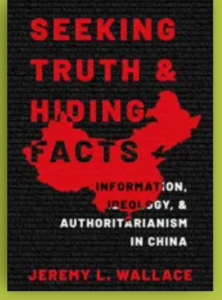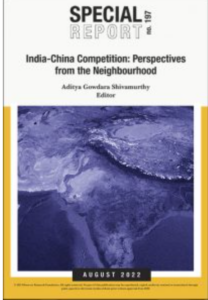Facebook’s parent company Meta announced Wednesday that it has taken down a network of more than 100 China-based accounts that posed as organizations in the US and Europe and pushed pro-Beijing talking points, CNN reports:
The Facebook and Instagram accounts, which included a fictitious news organization and posed as a think tank, likely used deepfake images developed through artificial intelligence to make the fake accounts appear legitimate….The network, which had more than 15,000 followers on Meta’s platforms, appears to have had some financial resources behind it. In one instance, the people behind the accounts called for protests in Budapest against George Soros, the billionaire philanthropist and frequent target of right-wing groups, and posted on Twitter an offer to pay people to attend. The accounts also offered to pay freelance writers to contribute to at least one of its websites.
 US senators announced a major cross-party effort Wednesday to combat China’s growing global influence by limiting the flow of investment and state-of-the-art technology to the Asian giant while deterring any potential threat to Taiwan, according to reports:
US senators announced a major cross-party effort Wednesday to combat China’s growing global influence by limiting the flow of investment and state-of-the-art technology to the Asian giant while deterring any potential threat to Taiwan, according to reports:
The push comes after President Joe Biden signed a package last year aimed at boosting competition with Washington’s main economic rival, with $52 billion in new subsidies for microchip manufacturing and scientific research. Launching the latest legislative drive in the Democratic-led Senate, majority leader Chuck Schumer framed the fight to rein in President Xi Jinping’s Chinese Communist Party (CCP) as an epochal struggle.
“The Chinese government is not constraining itself in its pursuit to dominate the 21st century, and if we in America were to rest on our laurels, if we let the CCP beat us, it would have serious consequences for the world’s democratic nations,” he said. “The United States cannot afford to cede its leadership to governments opposed to democracy and individual liberty. We cannot let authoritarianism call the shots in the 21st century.”
 China’s increasingly autocratic system will struggle to address the country’s demographic decline, says Fordham University’s Carl Minzner. Demographic trends spell a future of rising desperation, he writes for Foreign Affairs:
China’s increasingly autocratic system will struggle to address the country’s demographic decline, says Fordham University’s Carl Minzner. Demographic trends spell a future of rising desperation, he writes for Foreign Affairs:
The political economist Nicholas Eberstadt and the demographer Ashton Verdery have projected that by the middle of this century, roughly half of China’s citizens over 70 will have either one child or no children, up from roughly 20 percent today. Eldercare demands will rise across the country, but rural areas will face the heaviest burden. China’s rapidly aging migrants will increasingly face the need to care for themselves and their own aging parents in the countryside with limited support from the state or siblings.
“Increasingly powerful, prosperous, and authoritarian, China has become a more intense and successful competitor with the world’s established powers – economically, technologically, diplomatically, militarily, and in influencing people’s hearts and minds”, writes Bates Gill, Executive Director of Asia Society Policy Institute’s Center for China Analysis, in his latest publication, Daring to Struggle: China’s Global Ambitions Under Xi Jinping.
 A recent Central European forum produced a strategy that was a variation of a Cold War-era theme: Keep Russia down, the United States in, and authoritarian China out, notes Bart M. J. Szewczyk, a nonresident senior fellow at the German Marshall Fund and an adjunct professor at Sciences Po.
A recent Central European forum produced a strategy that was a variation of a Cold War-era theme: Keep Russia down, the United States in, and authoritarian China out, notes Bart M. J. Szewczyk, a nonresident senior fellow at the German Marshall Fund and an adjunct professor at Sciences Po.
But a common democratic front against Beijing is undermined by the French approach that it strengthens China’s ability to shape the world in its own authoritarian interest, as Macron acknowledged, he writes for Foreign Policy.
China’s leaders believe that China’s time has come, notes James Lewis, senior vice president at the Center for Strategic and International Studies (CSIS). A belief that hostility to China is generated by a desire to preserve U.S. hegemony reflects weak analysis rather than a systematic assessment of the nature of the United States’ global influence, but the concept of hegemon fits well with China’s Leninist orientation, he writes:
This changed direction for China’s foreign policy raises several questions: whether China can achieve its goal (after all, Marxism is the great policy failure of the last century), whether it is in the interests of democracies to oppose China’s rise and of so, how best to do this; why are some drawn to Mr. Rogers-style diplomacy; and how effective are Chinese influence operations in shaping these views.
For autocrats worldwide, and especially those in developing countries, China’s rapid economic development offers an attractive alternative to what many see as a confusing, cumbersome liberal democracy based on a culture of debate, Berlin’s American Academy observes.
 Ian Buruma highlights the cultural origins of this political propaganda, and disputes the underlying idea that people of Asia, and of China in particular, are not suited to liberalism. They share instead a collectivist, Confucian culture (known in today’s China as “Chinese-style socialism”), which differs greatly from the individualistic tradition of the West. Buruma ventures a critique of the notion that freedoms taken for granted in the West do not apply in non-Western countries.
Ian Buruma highlights the cultural origins of this political propaganda, and disputes the underlying idea that people of Asia, and of China in particular, are not suited to liberalism. They share instead a collectivist, Confucian culture (known in today’s China as “Chinese-style socialism”), which differs greatly from the individualistic tradition of the West. Buruma ventures a critique of the notion that freedoms taken for granted in the West do not apply in non-Western countries.
China has invoked the country’s Buddhist heritage as a soft power asset as part of its public diplomacy outreach in strategically significant nations with Buddhist majority or minority populations, research suggests. In Asia, these efforts are focused on countries already economically integrated with China such as Laos, Cambodia, and Mongolia.
How Governments and Civil Society Can Help China’s Uyghurs https://t.co/10dLNgz74y
— Democracy Digest (@demdigest) May 3, 2023
 The Biden administration has decided to remain publicly quiet on democratic backsliding in India, according to senior U.S. officials, as the U.S. intensifies efforts to keep New Delhi on its side amid rivalry with China, notes analyst Iain Duncan.
The Biden administration has decided to remain publicly quiet on democratic backsliding in India, according to senior U.S. officials, as the U.S. intensifies efforts to keep New Delhi on its side amid rivalry with China, notes analyst Iain Duncan.
Indian Prime Minister Narendra Modi’s pressure on religious minorities and the media is troubling, as is his party’s targeting of opposition lawmakers, said the officials, who asked not to be identified discussing internal deliberations, he writes for Bloomberg:
But the decision to largely refrain from criticizing Modi comes as growing concerns about China make India increasingly crucial to U.S. geopolitical and economic goals in the Indo-Pacific….The decision on handling India is an example of how Biden’s emphasis on human rights — and his framing of a global conflict between democracies and autocracies — has run up against the strategic realities of a world where rivals such as China and Russia are vying for greater control.
What the @ThinkDemocracy calls #CCP‘s #SharpPower exposed. The Facebook & Instagram accounts included a fictitious news organization & posed as a think tank, & likely used deepfake images developed through AI, @Meta said. https://t.co/k5HHkX6hIm
— Democracy Digest (@demdigest) May 3, 2023







